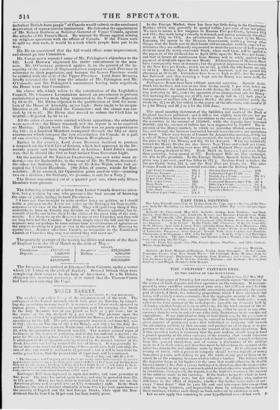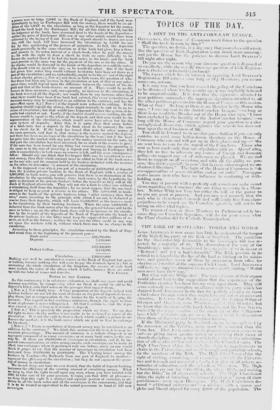TILE "DEPOSIT" CON1'ROVEI1S1'.
TO TILE EDITOR 01' THE SPECTATOR.
Knight,hridee. 21=1 Mal. 1840.
Sin—Your paper of Saturday last contains on article signed tI i■ (style its," ou the nature of bank-tit posits and their operation on the currency.. It is accom- pallied by sonic excellent continents of your own ; but still you mug feel that the subject is left involved in considerable uncertainty. and perplexity ; the greato part of which, 1 think, the following proposition, which I have (-isms lime laid down, will entirely remove,—namely, that the aggregate amount of the hack- ing circulation is, in every case, equal to the sum of the bank-notes issued, ridded to the total amount of the cash-deposits (pa:. 1111e on demand) held by all batiks, tt het her hanks of is,vie or otherwise, less the total tmiount of the re- say, s sLfrL each hank Irom, it necessary to keep, either iti specie or any other currency than its own, in order to meet the daily fluctuations in its receipts and expenditure. it any individual or hotly of individuals can, by the possession of wealth, or the reptltatiou of possessing it, succeed in keeping ill rirculation any gill it amount of promissory notes, that individual or conirany will increase the circulating medium by that amount, and produce an effect mum it in pro- portion to the ratio which it bears to the moonlit of the whole einctilation. But, it this operati,n makes it necessary that the note-makers shinthl keep in hand a greater quantity or the other curruncy of the country Onto would 01 lit•MVISe be required, such an addition to their cash in hand would he so notch wit hdrawn from the ;2.i:till:II circulation, and of course a diminution of the addition made to it by their rotes, aril therefore must be taken from time amount of the latter to estimate the real addition made by their ionic', If, in addition to the issuing of notes, mid) a per-on Cl' company should receive deposits of money from other itersolls, undertaking to pay the whole or ally [alit of I Lem oil de- mand, he or the company hecomes what is called a hanker. 'flue Ivilinee which the depositor keeps at his banker's is the same that would ol hell\ lie (/111(1 in his own hands: {..S.ce Note A] 11 Very farthing of it, therelhre, that themilder takes into the toarket, in any way, is so much added to what otherwise would hare been in circulation; consequently the deposit, less the banker's reserve, i- the amount of the :Melaka) made to the currency. If the hanker keeps the whole in band; things 11.111ttill as t hey were, but not otherwise. It dearly, else), makes no difference in the ctfeet of deposits, whether the honker is-acs mitts Or not : every "(lead deelit " that he puts life and soul into oiler, ill 10 competitiou. with its living brethren, tool impoverishes them by reducing the amount of their earnings, whether 511ell things as bank-notes are ill existence or not.
Let us now apply this reasoning to your hypothetical ease, of last week. If
person were to lodge 1,0001. in the Bank of England, and if the hank were iSiTnedintely to buy an Exchequer Bill with the money, there would be an ad- dition of the 1,0001. to the circulation as long as the depositor let the money lie and the bank kept the Exchequer Bill; for all this while it would, but for the lodgment at the Exchequer have remained dead in the hands of the depositor- aeither the price of yxcheguer Bills nor of any other article would have been enhanced by the laying of it out. Even if the deposit should be drawn out next day, still the bank will have increased the circulation by 1,0001. for one day by this quickening of the process of animation. In fart, the depositor stands practically in the same sitnation as if the bank had given bins a thou- sand pounds in its notes, instead of a check-book, when he paid the money ja; for with the right to draw a check he finds no more diffieulty to in- fin-eree the market than it' he had the bank-notes in his hand ; and the bank must provide in the same way for the payment of the one as for the other. if the checks would lie dormant in the hands of the depositor, so would the notes; if he should wish to spend the one, so he would the other. But if the bank bath given hint notes, they would without hesitation have been set down as a part of the circulation ; and so, undoubtedly, ought to be the :u:-nut of the right to draw cheeks given ; [Note st] and then, in both cases, the question of whe- tber there had been any increase in the circulation or not, at that or any subse- quent time, would depend upon the difference between the amount of the de- posit and that of the bank-reserve on account of it. There would be no dif- ference in these accounts; and, consequently, no increase in the circulation, if the hank reserved all the deposit ; nor would there he any increase, other than what there would have been if no bank had existed, (for every resuscitation of dormant money may be considered as an addition to the currency, and has the Ewe effect upon it,) [Note c] if the deposit were reduced to nothing. It' the depositor should expend the money, there might certainly be said to be an in- crease of circulation; but that would have happened whether the system of de- posits had existed or not. Lastly, if the banker should reserve nothing, the dif- ference would be equal to the whole of the deposit, and that sum would be the augmentation of the circulation, which would never have arisen but for the same 'system of deposits. After this, it is quite clear that every holder of a bank-note has a deposit in the bank equal to its amount; the note is his check for it. If the bank has issued that note for other money of the PAM amount, and kept it, that money is the reserve against the deposit, and there has been no increase of the circulation by the issue ; but if the bank has gone into the market with any part of the money received tbr the note, by that part the circulation has been increased, for so much of the reserve is gone. If the note has been issued for any thing but current money, the operation is the same as in the case of receiving a deposit and 11113 ing an Exchequer Bill with it immediately; in both eases no reserve is left, and the sante consequences follow. Should any one think that Exchequer Bills may be considered as cur- rent money, then their whole amount must be added to that of the bank-notes on the one side, and the amount held by the bankers deducted with the reserves on the other, to determine amount or the circulation.
In the supposed ease whi.h you put of a transfer of 20,000,000/ of deposits from the London private bankers to the Bank of England, with a reserve of 5,000,000/. in bank-notes, you will perceive that there England, no diminution of the circulation by the operation, because these bank-notes, by the hypothesis, lay quite as dormant at the private banker's before the trate,fer as they will at the Bank of England afterwards. They will not stir a limb in either case without stimulating draft from the depositor ; for we must suppose that the one hank is obliged to keep as great a reserve as the others. The 3,000,000/. in bank- notes in the hands of the private hankers, being " other currency than their own," must, according to the principle with which I set out, be deducted as reserve from their deposits, which will leave 15.000,000/. as the increase made in the circulation by their banking business. When the same 5,000,000/. is deducted from the bauk-notes after the transfer, the general balance will be the same as before; so, on the other hand, there will be no increase in the circula- tion by the transfer of the deposits of the Bank of England into the hands of the private hankers, for the latter must keep the supposed two millions of re- serve, as well as the former ; neither the one nor the other could in any way act upon the markets with it, without which there can be no changeln the circulation.
According to these principles, the drculation created by the Bank of Eng- land stood thus at the beginning of the present year-
Bank-notes A:16,166,000
Deposits .. 7,136,000
£23,502,000
Deduct bullion 3,134,000 Circulation f..20,011•1,0110 Nothing can well be enmidered as reserve at the Bank of England but sped, or bullion, because nothing else will serve to pay the demands upon it ; but in estimating the whole circulation of the kingdom, the reserve of ends hank must include the notes of the others which 0 holds, became these ow added up with the total of issues and deposits.
NOTES ItY law EntTou.
As this controversy is in substannY exhausted, we shall save space and avoid tiresome repetition, by compressing what we think it useful to add to lin GREEN'S letter, into brief notes on the passages that suggest them. [Note A.] Not wholly trite. A liege proportion of the deposit, lodged with London bankers are not left for Want of means on the part of depositors to CM- ploy them, but as compensation to the banker for the trouble of keeping the account. The deposit in titet emitinues stationary, though the right to draw it out at pleasure is never relinquished. All that is certain is, that the depo- sitor cannot tale it, so long as it remains in deposit. [Note B.1 This is precisely the proposition which we deny. We say that the right to draw checks neither is nor ought to be reckoned as a part of the circulation. It is not the right to draw a check which enables a person to in- fluence the market ; it is the hank-Mies which are paid to him in exchange for his cheek.
[Note c.1 "1:very suscitation of dormant money may lie considered as an addition to thecurrency." We think this untrue—at the best, it is most in- accurate phraseology. The amount of currency is a definite thing—it is ant aggregate composed so many sovereigns, or so many hank •notes, au4 the ease may be. II there are 10,000,000 of sovereigns in circulation, and if; by im- proved communications or other arrangements, each sovereign cats be made to effect two exchanges where it performed only one before, surely no one would think it proper to say that the number of sovereigns in circulation had been Increased front 10,0uo,1)00 to 20,000,000. The Clearing •house among the bankers in T.ondon—the Railroads fronts one part of England to another— augment the s;lliciency of the circulation ; but they do not augment the glean- tity of money in circulation. We do not deny, nor have we ever denied, that the habit of deposit-banking Increases the efficiency of the existing amount of circulating money. W hat we deny is, that the right to call upon any Man, whom you have trusted with 100/. to take Care or for your account, to repay you that 1001. at pleasure— We deny that this right is a distinct and separate portion of currency, int ad- dition to all the bank-notes and all the sovereigns in the community, and that it is to be treated as equivalent to the actual possession in hand of 100 new sovereigns.



























 Previous page
Previous page